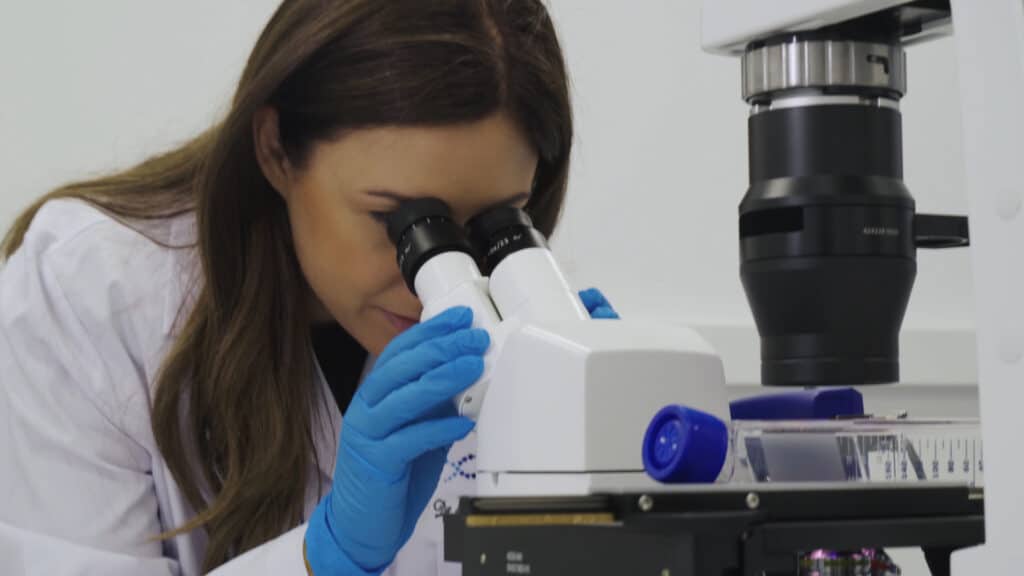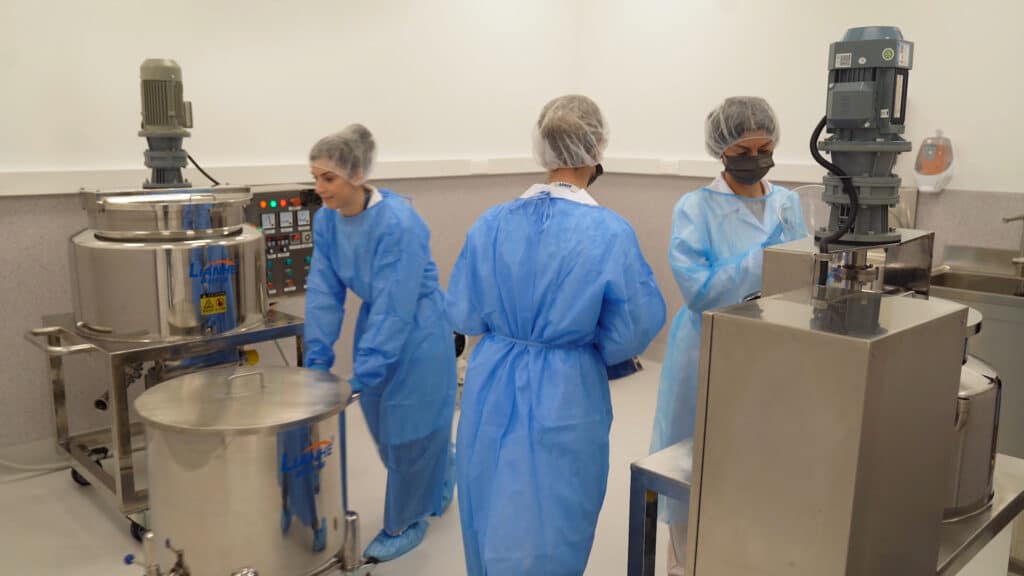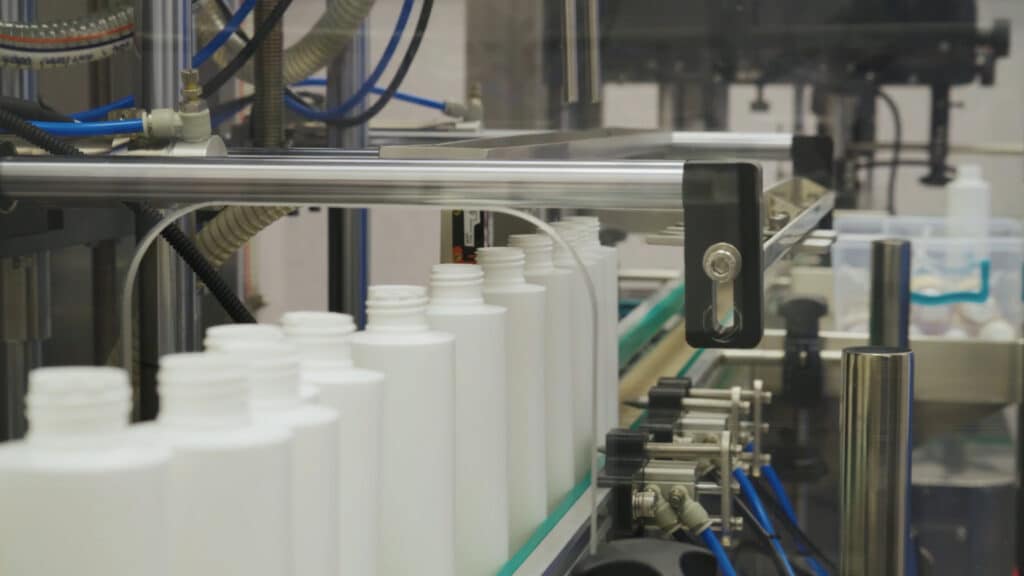In a woman working in Limassol on a cure for cancer, THEO PANAYIDES finds someone whose life fell apart when members of her own family died from it but is now content with a quiet life and medical breakthroughs on the island
I love my job, but it’s not like I’m curing cancer. Marianna Prokopi-Demetriades, on the other hand… But we’re getting ahead of ourselves, and we have quite a story to tell – of a life marked by tragedy and a remarkable start-up which, though not exactly a secret (Marianna’s three companies have received almost €3 million in funding in the past couple of years), still deserves to be better known. It’s a journey to an office in a ‘high-tech cluster’ in Limassol – actually Ayios Athanasios, just off the highway – from a childhood in Athens, a working-class family hailing from the island of Lefkada.
Money was tight; Marianna’s dad was away for a while, working in Saudi Arabia. Then, in May 1991 – when she was nine, and her sister was three – the family went on vacation to Santorini (a rugged place, before the tourist boom). “We’d gone on a bus to do a tour,” she recalls. Her mother was sitting beside her, “and she said, ‘Call your father, darling, I don’t feel well’”. They got off the bus; Mum complained of a headache, then threw up violently. They flagged down a car, and took her to a clinic where a diagnosis was made. Marianna’s mother, at 32, had suffered an aneurysm. A helicopter flew her to Athens; the kids stayed the night with family friends, then took the 15-hour boat trip to the mainland the next day. Two days later, their dad came to tell them that Mum had passed away. “I was very bonded with my mum. Because Dad had been away for five years, plus I’d been the only child for six years, so… Yeah, your whole world falls apart.”
Fast-forward a couple of decades, including nine years of studies in the UK: a Bachelor’s in Cellular and Molecular Biology, two Master’s in Biochemistry and Microbiology, finally a PhD at King’s College London. Money continued to be tight; with the exception of the PhD, which was on a scholarship, she worked throughout, staying in London during the summer to make money for the rest of the year, working menial jobs in supermarkets and restaurants. She recalls one night “when the little carton of milk was 35 pence – but I only had 32 pence”. She went hungry that night.
At King’s, she was Graduate of the Year in the Department of Medicine. She was offered a lecturer’s position at Imperial – but instead came to Cyprus, in 2010. At the end of 2011, her dad, a lifelong smoker, was diagnosed with advanced lung cancer; he died a month later. Then, in 2016, her 28-year-old sister – whom Marianna had practically raised, after the death of their mother – also got cancer, the result of a viral infection (Epstein-Barr virus) a decade earlier. Marianna brought her to Cyprus, and nursed her till she passed away in 2018.

Two important men had turned up in the interim. One was her husband Chrysses, the reason she found herself in Cyprus in the first place. (They have two kids, 11 and 9.) The other was Costas Pitsillides, “a brain” like herself, a biomedical engineer and MIT graduate who, like her, was trying to find gainful employment in the midst of the economic crisis. Marianna was working various part-time jobs, at Tepak and the two oncology centres; research grants had dried up completely. At one point, she sighs, “I picked up my four degrees and went to the unemployment office”. She and Costas were kindred spirits and worked on ideas, hoping for funds from the private sector. In 2016 they co-founded a company called Theramir – but they weren’t just co-founders, they were friends: she recalls how they’d take Marianna’s sister to oncology together, then sit on their laptops writing grant proposals for five hours while she did her chemo. “I tell him, ‘I hope the two of us never quarrel’,” she says with feeling. “Because we went through so much, putting all this together.”
What exactly is ‘all this’? There are, as already mentioned, three companies, all with the same co-founders, housed – for the past 18 months – in the high-tech cluster developed by Asbis, the brainchild of a Belarusian visionary named Serhei Kostevitch.

All very thrilling, of course – but then what about Promed Bioscience, founded in 2017? Marianna shows me a small vial of transparent fluid: this is high-purity collagen, custom-made for labs abroad (at Stanford, in Spain, in South Korea) that do “bioprinting of artificial organs… This is the ink,” she explains, “the bio-ink, for a bioprinter that will produce an artificial organ”.
The focus, again, is on cancer: breast-cancer survivors who undergo a mastectomy usually have lymphatic nodes and tissue removed as well, which can lead to a condition called lymphedema. Thus we have a small Cypriot start-up (there are only about 20 employees for all three companies) extracting collagen from “porcine tendons” – a.k.a. Cypriot pigs – and exporting it halfway round the world, to be turned into artificial lymph nodes and inserted in the bodies of cancer patients. “We’re very specialised, that’s why they find us,” says Marianna mildly, noting my dazed look of wonderment. (An accelerator called Kinisis Ventures also helped with the networking.) Actually, she adds, “the market is not yet ready for us – but we’re preparing for the market”; in the next few years she fully expects to see “bioprinting in situ”, meaning doctors making organs in actual operating rooms.
And then there’s Theramir – the first company she and Costas founded, filing for a patent soon after her sister got sick. This is the big one, using micro-RNAs (part of her PhD work, and somewhat similar to the mRNA used in Covid vaccines) to allow for specialised treatment, as opposed to the scattershot approach in chemotherapy. “We found a new pathway,” she explains, “where, instead of killing the cancer cells, we reverse the cancer cells back to normal. So, it’s a completely different mode of action.”
How is it done?
“Well, that’s our patent!”
They’re not the only ones working on this tech, of course; it’s the biggest news in medicine. What makes their own patent different – it’s now in the national phases, going for “global IP protection, which is very expensive but you have to do it” – is that it can target the liposome, the protective casing used to deliver micro-RNAs in the body. The liposome usually gets absorbed in the blood or else ends up in the liver or kidneys, making it less useful for cancers in the lungs, pancreas and so on. “To have found a formula, a vehicle” that can send it anywhere “is massive,” she says. (Are they the only ones to have found this pathway? “There might be more. But we are one of the first.”) They’re now finishing pre-clinical testing, reports Marianna, then they’ll either license the tech to a bigger company or begin Phase 1 trials in humans – and it’s all happening in Cyprus, with Cypriot scientists, though they’ll surely go abroad for “strategic partners” as the project takes off.

She’s bright, open, friendly. She seems very nurturing. She talks of flexible hours and work-life balance when it comes to her team (82 per cent of whom are female). “I think I’m one of the most boring people in Limassol!” she replies with a laugh when I ask about lifestyle. “Me and my husband.”
Do they work very hard?
They do, but it’s not really that. It’s just her style. “I’m not the person for going out dancing and going crazy. I was always, like, very quiet. I love family life and – y’know, to enjoy nice food with friends, at home. Small things… Now that it’s winter, I have a fireplace, and for the past month I’ve been going home around 6.30-7. I turn on the fireplace, work on my computer. Then the kids come down, and we have a little – y’know, marshmallows on the fire. It’s very nice.
“I like to give,” says Marianna. “Like for instance, I like to invite five or six friends and cook for them – to be the mother figure. I really enjoy it. Even to cook every evening, to serve my husband, my children. I want the family lunch on the weekend… I’m very traditional in some things. I might do crazy science, but on the other side I’m very, very traditional.”
Tradition means more to her – with her turbulent past – than it does to most people. She mentions how important it is “to belong somewhere”, adding that “Cyprus gave me a family”. She had no real bonds in Athens (all her relatives live in Lefkada), and of course she lost all her immediate family. She loves the rootedness of family; she craves it.
Life is good in general, of course. The start-ups are taking off, money is no longer tight (they live in Panthea, a desirable part of Limassol). She’s even been able to indulge her love of astronomy – an ironic hobby for a microbiologist, “from microcosm to macrocosm”; she got a telescope for her 40th birthday, which can also do astrophotography (there’s a photo of Saturn on her phone), and sets it up on her balcony on clear summer nights. It’s a funny thing about the universe, muses Marianna; it can look diffuse, like empty space – but a histological photo of tissue or cells also looks like mostly empty space, because you’re too close to it. Maybe space too, to a larger perspective – like God’s, for instance – would form a coherent whole, like the cells in our body form a coherent whole (a body) once you take a step back.
Is she spiritual, then? A scientist like her? “I wasn’t at all,” she replies, “but in the end I became.” Once her sister got sick, she lost all faith in God or religion – but in fact her materialism had already been shaken after listening to a talk by famous physicist Dimitri Nanopoulos who pointed out that, even scientifically, there’s no basis for assuming that we end up in the ground and that’s it: “Matter doesn’t end”. More importantly, “in the final week before my sister died” – she sighs, as if aware we’re wading into deeper waters – “I saw some things that make you realise you’re not alone in this world”.
Marianna talks about the night before her sister died, and the vision she had – a lucid dream? an out-of-body experience? – of following her to a corridor of light, a beautiful place, “and she turned around and said to me: ‘You still have a lot to give, and you have to go back. I’ll just go on from here’. A few hours later, she died”. Did it really happen? Was it just what she wanted to see, her mind creating a buffer to cushion the tragedy? Marianna doesn’t claim to know the answer – but since then, she says, “it’s what keeps me going”: the compulsion to give, to nurture, to work, to help others as if making up for her own loss. “In the end, we’re all aligned with the universe.” It all comes together: the warm personality, the believer in spiritual oneness, the compassionate, motherly scientist trying to give people relief. She tells me what she’s always told her children: “A happy person is a useful person”. A cure for cancer? It doesn’t get more useful than that.







Click here to change your cookie preferences